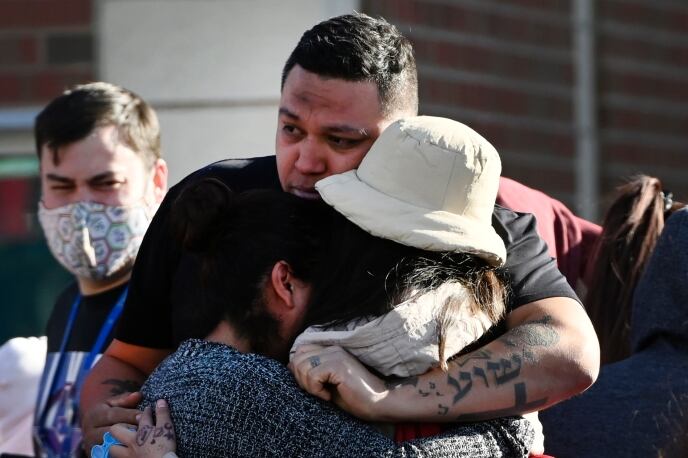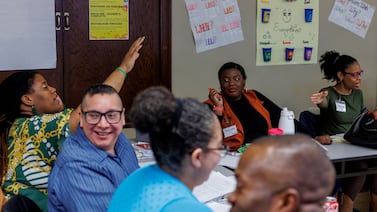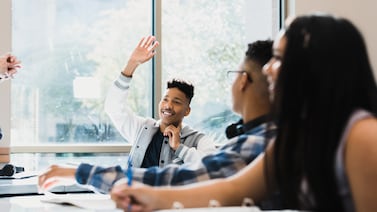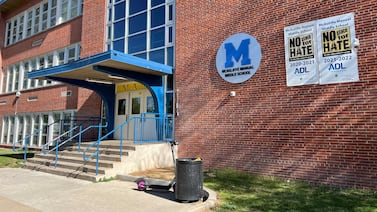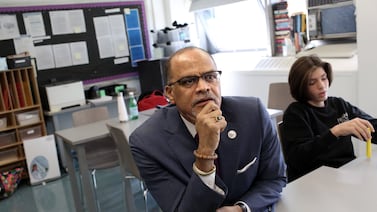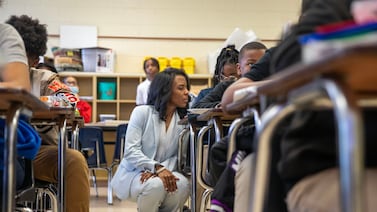When classes resume Monday in Aurora Public Schools, psychologist Brittany Greiert won’t be at the elementary and middle school where she normally works. Instead, she’ll be at Hinkley High School, where three teens were shot and injured in the parking lot Friday.
She and the rest of the district’s crisis response team will check in on the injured students’ close friends, relatives, and teachers. Counselors will be available to meet with any student who wants to talk, and they’ll provide talking points to teachers who want to discuss the incident in class.
Greiert did something similar last week at Aurora Central High School after six students were injured in a drive-by shooting at a nearby park. At Central, Greiert’s job was to support the teachers in the building who witnessed the shooting — sometimes with an act as simple as offering to watch their classes for a few minutes so they could take a break.
“Unfortunately this year all of our crisis teams have been very busy,” Greiert said.
The shootings have caused additional strain in a school community that, like others across the country, has been navigating a tumultuous period defined by the COVID pandemic and activism around social justice issues. School districts in cities such as Chicago, Philadelphia, and Memphis also have grappled with how to respond to youth gun violence.
In Aurora, the police chief and other city leaders have called the recent violence a public health crisis. The Denver Post reported that seven teens were shot in Aurora in the three weeks before the shooting near Aurora Central. Three of them died from their injuries.
Aurora Public Schools Superintendent Rico Munn said he wants to understand the reasons for the rise in violent crime: “We need to identify what are the threads that tie those things together that we can really attack to try to address what is a growing crisis in our community.”
Although school is out for the holiday week, Munn said he spoke Monday with the city’s mayor and police chief, as well as leaders from the local NAACP and faith-based community groups.
“I was just reaching out trying to hear about other people’s thoughts on what’s happening in the community,” Munn said. “We want to make sure we as a community identify ways to make every part of the community a safe haven for our students.”
In addition to offering extra mental health support, the district temporarily switched to a closed campus at Aurora Central last week, meaning students were not allowed outside during lunch. Munn said the district is exploring keeping safety measures like that in place until winter break.
Lolita Angelcheva, a student at Aurora’s Rangeview High School, has been fundraising for the shooting victims. She heard about the Hinkley shooting Friday when a friend got a phone notification during their criminal justice class. The teacher stopped the lesson and pivoted to talking about the recent violence involving Aurora students, Angelcheva said.
The violence feels like it’s escalating, Angelcheva said. “In past years, it was a threat or kids getting into fights and a gun being pulled,” she said. “It’s definitely bolder this year.”
While bringing additional psychologists and counselors into affected schools may be helpful to some students, Angelcheva said she’s never taken advantage of it. When her school went on lockdown three years ago because a student brought what turned out to be a BB gun to school, Angelcheva said she chose instead to talk to teachers she already knew.
“I remember when they told me they had counselors, I was like, ‘These are just random people. I don’t know who these people are,’” Angelcheva said.
Instead of responding after tragedies, Angelcheva said the district needs to invest in hiring mental health workers who can relate to students before an incident happens. In a district as diverse as Aurora, those counselors need to be people of color, she said.
Michélyn Johnson, the executive director and founder of an organization called RISE 5280 that takes African-American students to tour Historically Black Colleges and Universities, said her group has seen greater success connecting high school students with youth mentors, including young people who experienced violence but were eventually able to escape it.
“Most of the time, students want a space to just talk,” Johnson said. But she said teenagers tell her they’re scared to talk to teachers, and they’re unlikely to go to a local church or mental health center for help. “They typically go to friends,” she said.
Greiert, the school psychologist, said she understands the hesitancy.
“After a traumatic event, not everybody might need to talk to a counselor,” she said. “Some kids might want to reach out to close people in their lives. We’re available, but it’s not helpful for us to push those conversations on kids who don’t want to have them. Sometimes that might look like us supporting other staff members in the building who have those connections.”
Munn said he wants students to know the district is doing everything possible to help them feel safe.
“I want them to know, as we’ve said, when they come to school they are surrounded by adults who love and care about them,” Munn said. “We saw that in an explicit way with one of our own security officers being the one to step in and take protective measures. That’s who we are and that’s who we’re going to continue to be.”
But Angelcheva said she worries the adults aren’t going to take the bold action that’s needed.
“My biggest fear is we’re going to come back from Thanksgiving break and nothing is going to change,” she said. “That looks like a big possibility right now. I feel like I’m hearing blank answers.”
Yesenia Robles contributed to this report.


